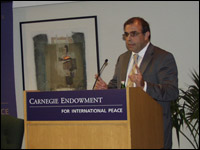Registration
You will receive an email confirming your registration.
IMGXYZ748IMGZYXOn July 10, 2007, the Carnegie Endowment released a new and timely report, Rethinking Western Strategies Toward Pakistan: An Action Agenda for the United States and Europe, by Visiting Scholar Frederic Grare. Stephen Cohen from the Brookings Institution and Mark Schneider from the International Crisis Group served as discussants, while Carnegie Vice-President George Perkovich moderated the event.
Describing the nature of the problem in and emanating from Pakistan, Frederic Grare discussed the causes of the current domestic political crisis as well as Pakistan’s role in Afghanistan and Kashmir. He argued that contrary to Western perceptions, the army and its monopoly of political power is responsible for the current problems in Pakistan. While there was reason to be skeptical about the civilian return to power, civilian governments had much better track records in managing domestic crises in provinces like Waziristan and Balochistan. Military power was not simply “an unfortunate but necessary step” before democratization; rather, it had an adverse impact on the social fabric of the country.
Grare argued that the current policy of reinforcing the capabilities of the Pakistani state, assuming that increasing capability would increase cooperation levels, is fundamentally flawed. Advocating a shift away from this strategy, he recommended a more political approach that would involve breaking the strong links between the army and politics, while allowing the army and intelligence apparatus to exist as it would in any other democratic country. Grare stressed that such a transition would have to take place within the context of the Pakistani Constitution, emphasizing that the goal of democratization could not be de-prioritized.
Grare also recommended conditionality of assistance to Pakistan: if you reward Pakistan for what it does, you should also be prepared to increase the cost of non-cooperation and non-compliance in areas they have already agreed to. He concluded with a warning that the cost of allowing the status quo to continue would be high.
Stephen Cohen placed the growing radicalism in Pakistan within the larger context of the global upsurge in Islamic radicalism. Lamenting that the trend in Pakistan was definitely towards greater radicalization, he found the increasing urban radicalism to be a scarier phenomenon than tribal radicalism since the urban population have greater resources and a greater ability to hurt their opponents.
Cohen concurred with three key recommendations of the report: 1) Pakistan, and its future, is an issue that needs to be dealt by the West, including the U.S., Europe, NATO and its allies, and not the United States alone; 2) Conditionality of assistance was crucial in securing the maximum support from Pakistan for U.S. interests; and 3) A grand bargain between Pakistan and the West (including NATO) should be considered to address Pakistan’s key security concerns while ensuring that it cooperated fully with the West. Looking to the future, Cohen pointed to the possibility of Musharraf imposing a national emergency or martial law if the situation worsened, in which case elections would be postponed.
Mark Schneider also concurred on the need to rethink the strategy towards Pakistan. He pointed out that there was a difference between abandoning Musharraf and abandoning Pakistan. While the Bush administration was unlikely to adopt any major fundamental rethinking on Pakistan, Schneider believed that the Congress might enact some changes through legislations. In addition to H.R.1, he pointed to the Department of Defense (DoD) Authorization floor and the DoD Appropriations Bill as opportunities for the Congress to establish conditionality of assistance focusing on the closing down of Taliban command and control centers and positive movement towards democracy. He emphasized that Pakistan must be told in unequivocal terms to go after Al Qaeda and the Taliban, as well as close down publicly funded extremist madrasas. he identified five benchmarks for progress towards the establishment of civilian rule: 1) no imposition of national emergency or martial law; 2) no political interference with the judiciary; 3) free and fair elections and the return of political exiles to Pakistan; 4) international monitoring, starting now, of parliamentary and presidential elections; and 5) Musharraf’s renunciation of the Chief of Army position if he runs for President. He concluded by drawing attention to the negative consequences and damage to the U.S. interests due to alliances with military governments in South America and elsewhere, stressing that U.S. interests were promoted more when civilian governments were supported.
In the discussion that followed, it was stressed that the problem in Pakistan stemmed not from the dominance of a particular individual like Musharraf, but from the army’s institutional dominance. Drawing a distinction was drawn between Pakistan’s religious conservatism and radicalism, some participants pointed out that most Pakistanis are conservative but not necessarily radical. The panel clarified that the report was recommending ‘smart sanctions’ or even ‘smart carrots’ targeting the army and its subsidiary institutions, rather than hurting the Pakistani people. Countries like Saudi Arabia, China, and U.A.E. could indeed attempt to step into U.S. shoes if the U.S. withdrew support from Pakistan, but did not possess the technological superiority that the U.S. could offer Pakistan, especially on the military front.
The panel emphasized that Pakistan should only be asked to uphold what it has already publicly committed to do. Grare clarified that he was not advocating regime change but simply urging greater adherence to, and political change based on, the Pakistani constitution itself. He refuted claims that the Pakistani government lacked the capability to live up to its promises by pointing to the terrorist infrastructure and madrasas imparting radical education, while reiterating Pakistan’s responsibility in establishing a stable Afghanistan.
For the full text of the report, please click here.
This summary was prepared by Anirudh Suri, Junior Fellow in the South Asia program at the Carnegie Endowment.
